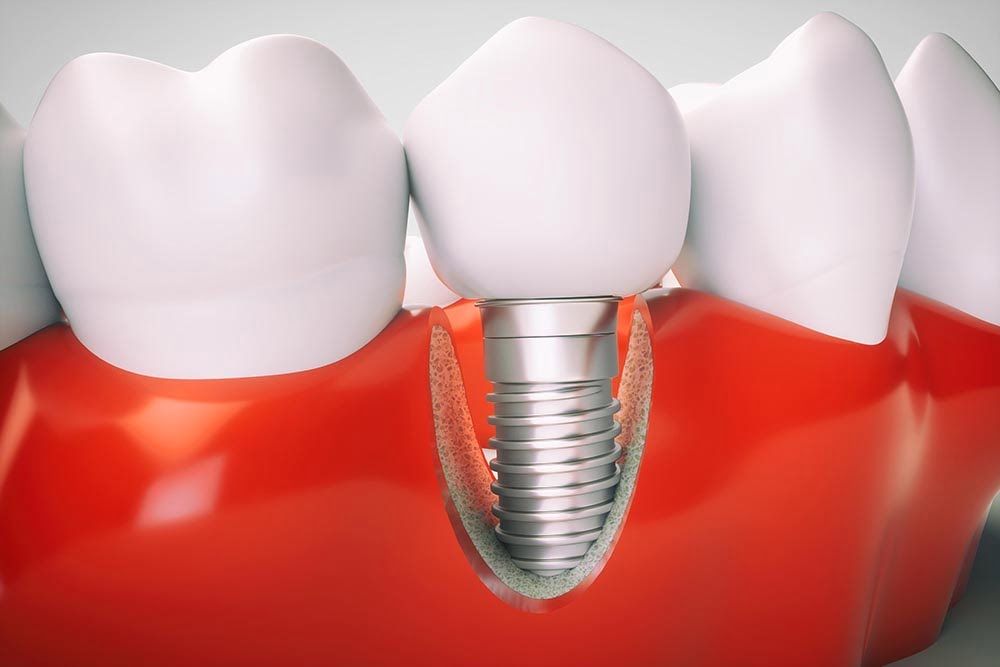Dental Implants Near Box Hill

Dental Implants Near Box Hill
When a tooth is badly damaged and has no hope of survival, it has to come out. The best option is to replace it with an artificial tooth that we call a dental implant.
The concept is simple. A metal fixture – usually a screw – is placed in the jawbone to act as an anchor for a crown, which looks very much like the natural teeth around it.
Because implants are so effective, and the process is now so common, getting a dental implant to replace a missing tooth has become a relatively popular treatment option for patients in the Box Hill area.
Can anyone get a dental implant?
While not everyone is an ideal candidate for a dental implant, most people who have a good level of general physical health and reasonable oral hygiene can confidently go through this treatment.
Any patient who has a missing tooth (or more than one) or who has a very damaged tooth or teeth, should consider the option of getting a dental implant here at Middleborough Dental Care in Box Hill.
The starting point for assessing the suitability of a candidate for a dental implant is by taking an x-ray of the jaw. We need a reasonable amount of dense bone tissue at the point of the implant to have the best chance of successful surgery.
What are dental implants made of?
Most dental implants are made from titanium, a lightweight, non-magnetic metal that is resistant to corrosion and – most significantly – that the human body tends to accept.
Where there is enough jawbone, the most common type of implant is the screw or cylinder shape known as an endosseous implant.
How is a dental implant inserted?
The procedure to complete a dental implant involves scans and x-rays, alongside a series of minor operations several months apart. The slow natural growth of bone in the jaw around the implant dictates the timeline of the entire process.
Here’s how we typically provide a patient with a new tooth using a dental implant:
-
We start by taking scans and x-rays to give us a clear picture of where to place the implant within your jaw and relative to the adjacent natural teeth.
- If there is an existing tooth that has to be removed, this is done under local anaesthetic.
- The dental implant itself – which resembles a metal screw – is permanently attached to the jawbone where the missing tooth’s roots were. This procedure is also conducted under a local anaesthetic so that it is a relatively comfortable and pain-free experience.
- Over a number of months, the bones around the jaw start to grow around the implant, which helps to hold it in place. A series of dental visits will take place to ensure that this is the case.
- Once the implant is sufficiently stable, the dentist will make a mould of your mouth that will be used to make an artificial tooth (or number of teeth).
- An artificial tooth or crown that has been tailor-made to look like your remaining teeth in shape, size, and colour, is then placed and securely attached to the ‘screw’ to fill the gap.
- You can then enjoy the teeth and smile that you had previously.
What are the benefits of a dental implant?
Having completed dental implant treatment, some of the benefits you can expect include:
-
Improved appearance: Dental implants are made to closely resemble your existing teeth.
- Improved comfort: Dental implants are a permanent fixture.
- Greater ease of chewing: Dental implants work exactly like your remaining natural teeth.
- Convenience: No need to remove dentures or feel discomfort or lack of effective bite.
- Confidence: Most importantly, you’ll feel better about yourself because the smile you once had is back for good!
How much does a dental implant cost?
A single implant can cost on average $4000-6000. There is no one-size-fits-all solution or calculation. The variation in costs will depend on each individual’s situation, based on the following factors:
-
What work needs to be done before the implant surgery?
Extraction of the existing tooth needs to be done in a non-traumatic way. Preparing the jaw for an implant might take a little more work, especially if the bone needs a graft to ensure it is sufficient for the surgery. - What sort of implant do you need (or want)?
Once you know what sort of implant is best, you might still have a choice of materials or manufacturers. Your dentist will advise you on the options. - What crown design will you get?
The crown will ideally mimic the size, shape and colour of the original tooth. Its height will be designed according to your natural bite. - How many visits will you need?
It might take four or five separate visits to the dentist over three to six months before the work is complete.